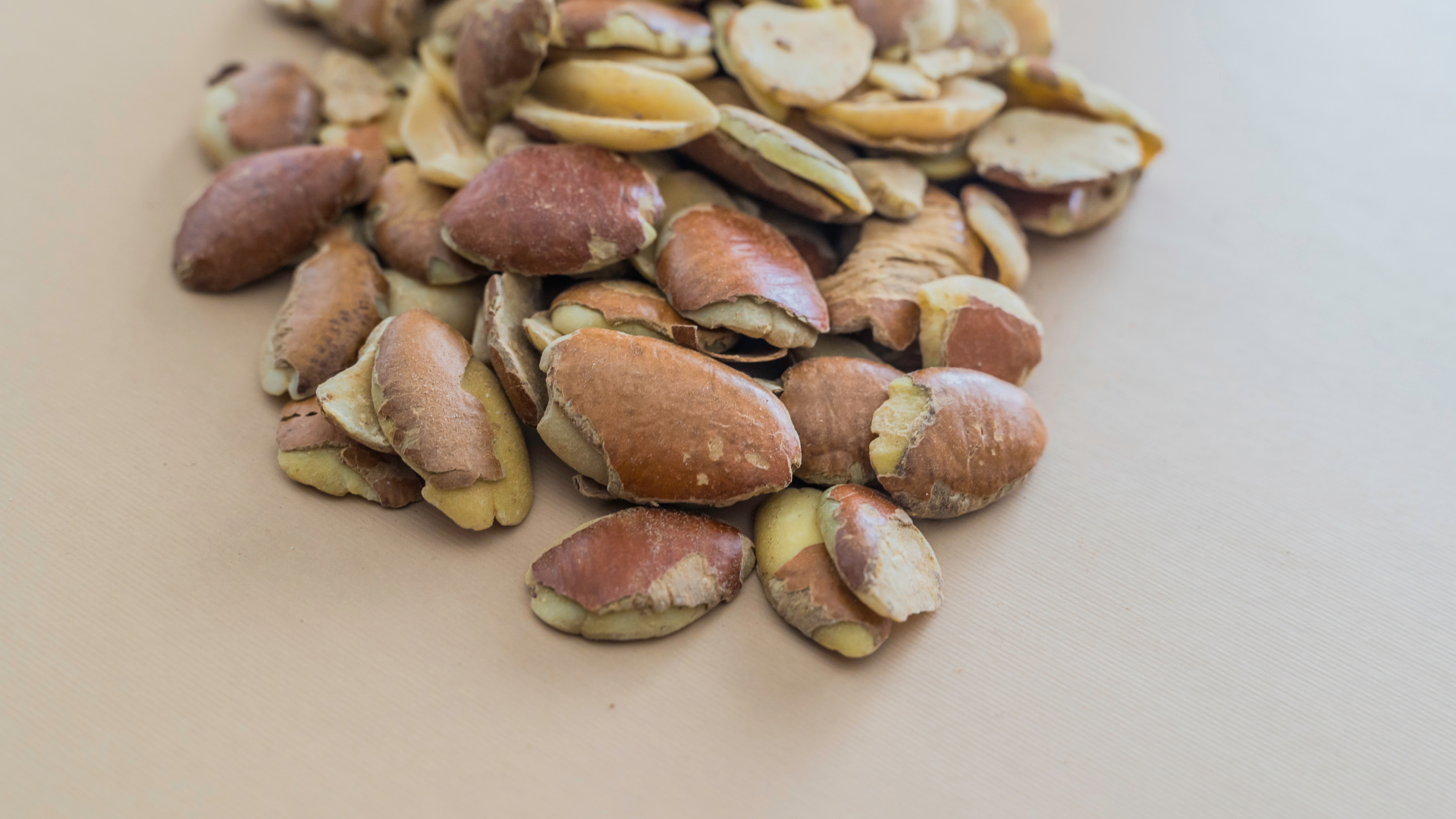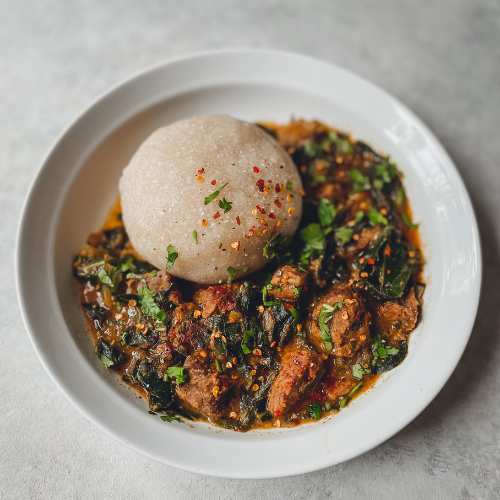
Although many people eat ogbono regularly in Nigeria, very few are aware of their health benefits.
The health benefits of ogbono include raising the levels of high-density lipoprotein (good) cholesterol, promoting weight loss and reducing inflammation. Ogbono seeds are also nutritious because they are rich in calcium, phosphorus, iron and zinc. They are also good sources of antioxidants, including polyphenols, carotenoids and flavonols.
Keep reading to learn more about ogbono.
What is ogbono?
Ogbono, botanically known as Irvingia gabonensis, and African mango, bush mango, or dika nut in English, is a multipurpose fruit native to West and Central Africa.
Ogbono fruits are available from May to September, with peak harvesting in June and July. The fruit is oval-shaped and broad, with a thin skin, fleshy pulp when ripe and a hard, stony nut encasing a soft, oil-rich kernel wrapped inside a brown seed coat.
The kernel, commonly referred to as a seed, is widely eaten and is what we call ogbono or dika nut. These kernels are an essential part of West and Central African diets, providing carbohydrates, fat and protein. They can be eaten raw, roasted, or ground and cooked with meat, vegetables, and spices.
Nutritional Value of Ogbono Seeds
On average, 100g of ogbono contains 704kcal, 7.9g protein, 66.9g fat, 16.4g carbohydrate, 2.2g fibre.
Ogbono is an energy-dense seed, providing 595–729 kcal per 100g portion. It primarily comprises fat (71%), with moderate amounts of protein (~22%) and minimal carbohydrates (~3%).
The fats in ogbono are primarily saturated fatty acids (~97%), and the remainder is a combination of monounsaturated and polyunsaturated fatty acids.
Ogbono seeds are sources of many essential minerals, including calcium (164mg per 100g), phosphorus (202mg per 100g), iron (3.4mg per 100g), copper, and zinc. They are also sources of antioxidants, including flavonoids, carotenoids, and polyphenols.
Health Benefits of Ogbono Seeds
Scientific evidence for the health benefits of ogbono seeds is limited. However, studies in mice show that ogbono may raise the levels of high-density lipoprotein ‘good’ cholesterol. It may also promote weight loss in overweight and obese adults and reduce inflammation.
A 2005 randomised controlled study in Cameroon investigated the effects of ogbono seeds in 40 adults with obesity (Ngondi et al., 2005). A total of 28 received 1.05g of ogbono seeds three times daily for one month while 12 received a placebo. All participants ate enough calories to maintain their weight.
However, after 30 days, people taking ogbono seeds significantly reduced their weight by 5.26% while those taking the placebo reduced their weight by 1.32%. Notably, the individuals in the ogbono group also significantly reduced total cholesterol, LDL-cholesterol and triglycerides, while increasing HDL (good) cholesterol levels. Participants in the placebo group did not experience any of these changes.
Is Ogbono Good for Diabetes?
Ogbono lowers blood glucose levels in rats with diabetes. And although it increases insulin sensitivity, lowers blood glucose, waist circumference and triglycerides in patients with metabolic syndrome, there is currently insufficient evidence for its benefits in humans with diabetes.
Is Ogbono Soup Fattening?
Ogbono is not fattening even though it contains a lot of saturated fat. Fat gain occurs from eating more calories than you burn and not from eating a particular food. Ogbono can be part of a healthy diet if you cook it with small or moderate amounts of palm oil, lean meats or fish, and plenty of green leafy vegetables and eat a moderate portion.
Is Ogbono a Carbohydrate?
Ogbono is not a carbohydrate because it is made up of only 3% carbohydrates. Instead, it is considered a fat source because it is made up of 71% fat.
Where to buy Ogbono
In West Africa, ogbono is available in any local market. In England, ogbono is available from most local ethnic stores. You can also order it online on Amazon.
How to Cook Ogbono soup
Ogbono is slimy when cooked because of its high-fat content.
To cook ogbono soup, put beef into a pot, season with vegetable stock cubes, chopped onions and chilli powder. Allow beef to cook until almost tender, then stir in ground ogbono seeds and a splash of water to loosen the soup. Add leafy greens, ground crayfish and palm oil. Allow to cook on a simmer for around five minutes or until the greens are tender. Take the pot off the heat and enjoy with any cereal dough.
Most ogbono recipes are incredibly high in saturated fat and sodium. You can get a more detailed and healthier recipe for ogbono in my new cookbook: Cook It – The Whole Way.

REFERENCES
- Mateus-Reguengo, L., Barbosa-Pereira, L., Rembangouet, W., Bertolino, M., Giordano, M., Rojo-Poveda, O. Zeppa, G. (2020) Food application of Irvingia gabonensis (Abury-Lecomte ex. O’Rorke) Bail., the ‘bush mango’: A review. Critical Reviews in Food Science and Nutrition, 60(14): 2446–2459.
- Onimawo, I.A., Oteno, F., Orokpo, G., and Akubor, P.I. (2003) Physiochemical and nutrient evaluation of African bush mango (Irvingia gabonensis) seeds and pulp. Plant Foods for Human Nutrition, 58: 1–6.
- Stadlmayr, B., Charrondiere, U.R., Eisenwagen, S., Jamnadass, Kehlenbeck, K. (2013) Nutrient composition of selected indigenious fruits from sub-Saharan Africa. Journal of the Science of Food and Agriculture, 93(11): 2627–36.
- Onakpoya, I., Davies, L., Posadzki, P., Ernst, E. (2013) The efficacy of Irvingia gabonensis supplementation in the management of overweight and obesity: a systematic review of randomised controlled trials. Journal of Dietary Supplements, 1: 29–38.
- Ngondi, J.L., Etoundi, B.C., Nyangono, C.B., Mbofung, C.M., Oben, J.E. (2009) IGOB131, a novel seed extract of the West African plant Irvingia gabonensis, significantly reduces body weight and improves metabolic parameters in overweight humans in a randomised, double-blind placebo-controlled investigation. Lipids in Health and Disease, 8:7
- Hossain, M.S., Sokeng, S., Shoeb, M., Hasan, K., Moshihuzzaman, M., Nahar, N., Ali, L., & Rokeya, B. (2021) Hypoglycemic effect of Irvingia gabonenesis (Aubry-Lacomate Ex. Ororke), Baill in type 2 diabetic long-Evans rats. Dhaka University Journal of Pharmaceutical Sciences, 11 (1), 19-24.
- Villar, M.M-D., Gonzalez-Ortiz, M., Martinez-Abundis, E., Perez-Rubio, K.G., Cortez-Navarette, M. (2018) Effect of Irvingia gabonensis on metabolic syndrome, insulin sensitivity, and insulin secretion. Journal of Medicinal Food, 21(6): 568-574.



The Comments
Victor Ita
It was quite eye opening to me. Thanks a million times for this write up
Ogbono Soup: A Traditional Nigerian Dish – Food & Drink
[…] a popular Nigerian delicacy, is enjoyed in every part of the country. The seed-grown ogobono fruit is not a native species, but rather a seed-grown fruit that is not edible. A popular Nigerian […]
Precious
Yes it was
Dr Liz
Awesome resume!! Thanks for the info!